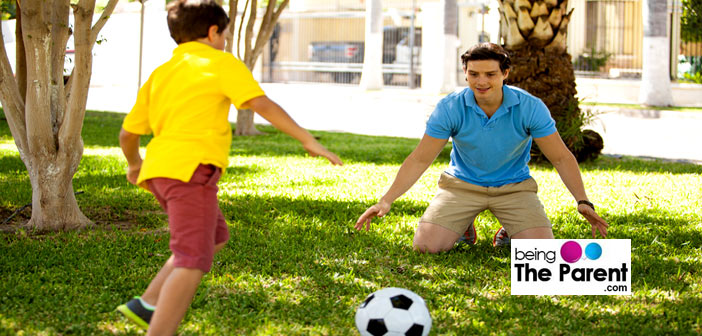
Dads are not like Moms. They cannot be. They tend to have a different way of thinking on all subjects of life, and when it comes to kids, they simply do not have the ‘Mommy Brain’. Why, most dads think of disciplining as showing the kids as to who is the boss around, or completely ignoring all the mistakes of the child. But research in this field has proved that the more involved a father is with his kids, the successful they are(source) Children of involved fathers do well emotionally, socially, and academically. They are more secure and rooted in their life, with clear goals and ambitions. That should be enough motivation for fathers to get more involved with their kids, shouldn’t it be so?
Fathers Role In Disciplining A Child
It is not just the mother’s duty to discipline the children and teach them how to behave. Fathers are equally responsible for administering discipline to their children. Due to the fast pace of life, demanding jobs and lack of time, fathers today are less involved with their kids and do not share the same amount of parenting duties as mothers. Generally, when kids misbehave or do something that they should not have done then fathers leave it up to the mothers to administer discipline to the child. This may be because they do not feel connected enough to the child due to the fact that they are unable to spend as much time with them as their mothers. But it is necessary that a father and mother both join hands to discipline their children. Here are some tips on how can fathers discipline their children.
7 Tips For Dads To Discipline Their Children
-
- Be a good role model: No matter how young your child is, a Father is the first role model for him. Your child looks upto you on how he wants to live his life, and if you are rigid in your approaches, he or she will be inflexible too. The way you conduct yourself, even when the child is not around, is the way your child is likely to conduct himself. If you yell or shout on the pretext of discipline, your child will get the idea that screaming and shouting is actually alright to get things done. Do not behave the way you would not want your kids to, it is as simple as that
- Talking and advising: It is not required that you shout at your child or lose your temper trying to discipline him. You should rather talk to them and make them understand why you do not want them to do a certain thing. For example, if your child is touching a sharp object like a knife or a scissor then show him that he/she could get hurt by the sharp end. If you are angry at them then raising your voice, yelling, swearing and unnecessary beating will teach your child that it is okay for them to behave the same way. They will start copying you and hit other people or yell at them when they get angry about something as well. Hitting or physically punishing the children will only make them stubborn and obstinate so it is better that you make them understand the bad consequences of doing the wrong thing rather than setting a bad example for them to copy
- Playing and spending quality time: Play time often translates into learning time with little efforts from the parents. When you play, explain the importance of fair play to your child. When you rough them up, they learn the importance of not losing their emotions when dealing with aggressive impulses. Because when dads play, it is mostly physical and more exciting, and so encourages competition and independence. When you spend quality time with your kids, they feel more secure around your presence. By being with your child, you get to know about your child’s life, his challenges, issues and thoughts
- Reward your child for good behavior: Only punishing them for wrong behavior is not adequate; you should also reward them for their good behavior. This will encourage them to repeat the good behavior and make a habit out of doing the same every time. A reward does not mean bribing them with something like a candy or a toy but positive encouragement and praise. Bribing will make the child think that he has to act inappropriately first and then correct his behavior to get a reward. Teach them the difference between right and wrong gently and encourage them to indulge in good habits

- Do not be over critical or illogical: You have to understand that your child is young and he/she is bound to make mistakes. Children are curious and they might touch or spoil some important thing or document. In such cases, do not be very harsh or critical and understand that your child did not do it on purpose. If your child is repeating a particular bad habit again and again then try to understand why your child is doing so. It might be because he/she may be upset about something. Also, do not keep reminding the child of his/her mistakes again and again. Respect your child and be patient with him if you want them to behave properly and in a good way
- Encourage controlled risk: Since fathers encourage kids to take the risk, unlike mothers who are more protective in nature, they cal also give valuable lessons to their children. Risk assessment is something that kids of involved fathers learn early on. And what is life without risks!
- Be consistent: So you are tired and your child throws a tantrum. What do you do? Give in to your child? Because the last time this happened, you sat your child down, explained to him why it is not good to have ice-cream at this odd hour, offered him a snack instead and asked him about his game score. But now, you simply give in and hand over the ice-cream tub to him. This sets a confusing stage for your child. Being consistent in your disciplining approach is a must if you want your child to stop the misbehavior. Consistency is critical to effective discipline
Setting healthy behavioral boundaries for kids in early stages paves the way for disciplined young adults. Before you actually set on the trajectory to discipline your kids, do your homework. Don’t be the Dad who thinks ‘raising the voice and making the kids listen’ is the way to discipline – for it isn’t. Of course, you love your child, but make sure you understand him too!

